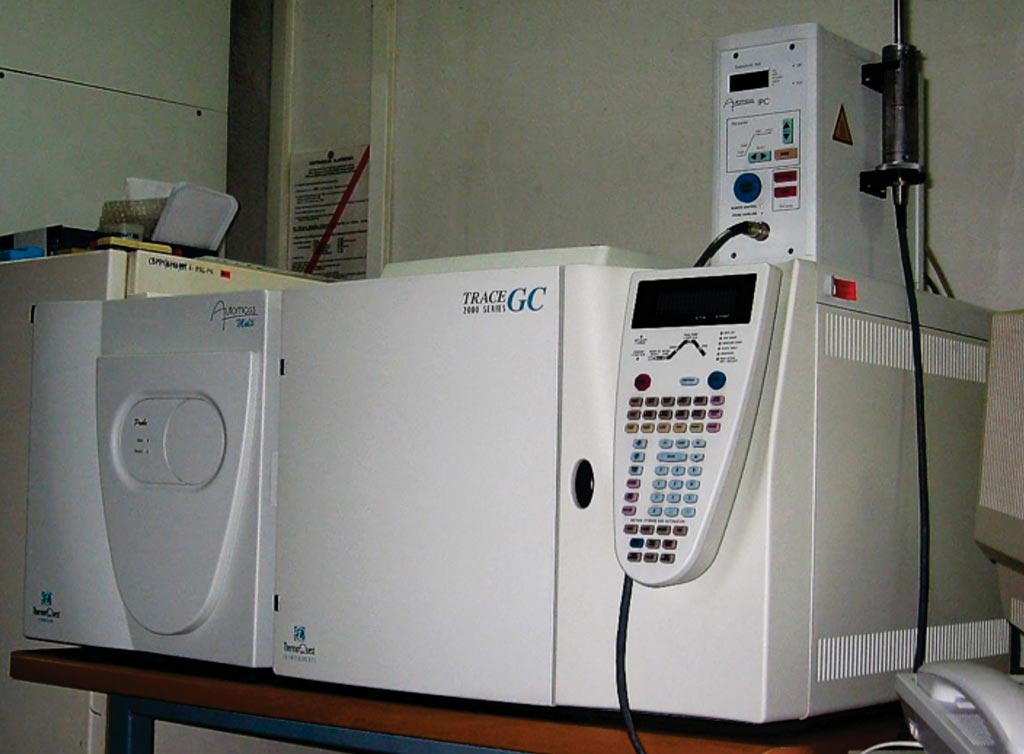Metabolites Altered in Chronic Kidney Disease
By LabMedica International staff writers
Posted on 07 Dec 2017
Chronic kidney disease (CKD) is an important public health problem with a high prevalence worldwide, from 10% to14% of the general population, and strongly increased age-standardized death rate, yet, there is a paucity of effective treatment options.Posted on 07 Dec 2017
Metabolomics, the quantitative analysis of small molecules in biological samples, has uncovered numerous abnormalities in the blood of uremic patients. The tri-carboxylic acid (TCA) cycle is significantly impacted in chronic kidney disease supports the view of CKD as a state of mitochondrial dysfunction.

Image: The ThermoQuest Trace GC 2000 gas chromatography mass spectroscopy (GCMS) platform (Photo courtesy of Strona Polimerka).
Scientists collaborating with those at the University of Texas Health Science Center at San Antonio (TX, USA) compared 22 non-diabetic CKD stage 3–4 patients and 10 healthy controls to identify abnormalities in plasma and urine present in CKD patients. Inclusion criteria for the study included age ≥ 18 years; estimated GFR 15–59 mL/min/1.73m2; and fasting serum glucose 100–125 mg/dL. They also studied gene expression in kidney biopsies from 155 patients from the European Renal cDNA Bank cohort with biopsy-proven, non-diabetic CKD.
Plasma and urine samples were analyzed on a gas chromatography mass spectroscopy (GC–MS) platform at Clinical Metabolomics Inc (San Diego, CA, USA). A panel of metabolites has been established over the years to detect inborn errors of metabolism, and the focus on organic acids is also well suited for CKD. Since the handling of these compounds are central in kidney function and metabolism and includes metabolites from 37 different metabolic pathways. Eleven of these pathways were represented with a sufficiently high number of metabolites so that potential perturbations could be detected with significance. All citric acid cycle metabolites except succinyl CoA and oxalacetate were measured.
Plasma concentration and/or urinary excretion of 49 unique metabolites varied significantly between CKD patients and healthy controls after correction for multiple testing. The largest relative differences in plasma were for 3-hydroxybutyrate, the most abundant ketone-body, and hippurate, a well characterized gut-microbial end-product, with 113% and 109% higher plasma concentrations in CKD and unchanged urine excretion, respectively. In CKD, long chain fatty acids stearate (C18:0) and palmitate (C16:0) were higher in plasma while urine excretion was lower. There were significantly reduced messenger RNA (mRNA) levels for ten citric acid cycle enzymes, compared with controls.
Stein Hallan, MD, PhD, a visiting professor and the lead author of the study, said, “We analyzed these small molecules in the blood and urine of non-diabetic patients with chronic kidney disease and compared the results to samples obtained from a group of healthy individuals. Importantly, our study identified that a group of molecules called tri-carboxylic acid (TCA) cycle metabolites are significantly affected in chronic kidney disease.” The study was published online on October 30, 2017, in the journal EbioMedicine.
Related Links:
University of Texas Health Science Center at San Antonio
Clinical Metabolomics













